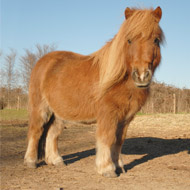
Horse immune system acts in two different ways in response to midge bites
Shetland ponies are helping researchers understand how people could be prevented from developing allergies, according to a new study.
Researchers at the University of Edinburgh said that the horse immune system responds to midge bites in a way that prevents, rather than triggers, allergic reactions.
The study of Shetland ponies found that their immune system acts in two different ways in response to midge bites.
One of these responses triggers allergy symptoms, such as itching and inflammation, while the other prevents an allergic reaction.
The team found that after being exposed to midges, the horse immune system releases various types of factors, known as cytokines, which affect the behaviour of other cells.
Ponies that react to midge bites release cytokines, known as IL-4, which trigger allergy symptoms.
In ponies not sensitive to bites, another cytokine, INF-g, is released, blocking different immune cells that would otherwise trigger allergic reactions.
The researchers say that by priming the human immune system to respond to allergens in a way that does not trigger reactions, it could be possible to prevent people developing allergies.
Lead author of the study, Dr Dietmar Zais from the University of Edinburgh's School of Biological Sciences, said: “To our knowledge, this is the very first study of a natural allergic disease in which we can show that immune responses to allergens can take two directions, either leading to allergy or to tolerance.
"We believe this finding could have direct practical implications, for example by helping immune responses to choose the 'right' direction in individuals who we would like to protect from developing occupation-associated allergies.”
The study, published in the journal PLOS ONE, was funded by the Dutch Foundation for Technical Sciences (STW) and was carried out in collaboration with researchers in the Netherlands.



 The veterinary mental health charity Vetlife is inviting the veterinary community to join it for a sponsored cold-water dip.
The veterinary mental health charity Vetlife is inviting the veterinary community to join it for a sponsored cold-water dip.